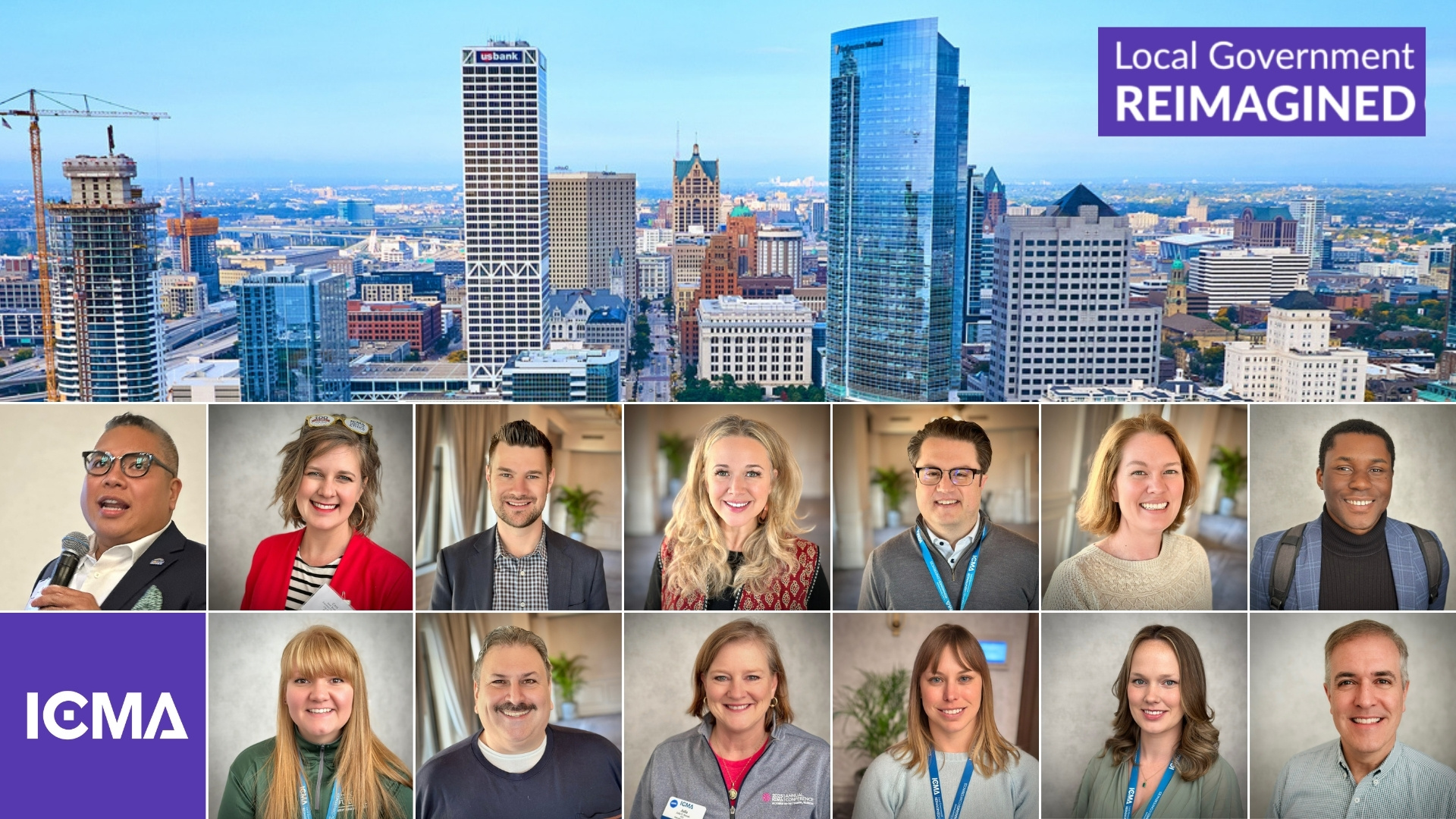
"Resilience" is far from just a buzzword. For local governments today, it is a necessity. Whether facing natural disasters, economic shifts, adopting new technologies, or growing public expectations, preparing more adaptable communities is critical to long-term success.
At ICMA's 2025 Local Government Reimagined Conference in Milwaukee, Wisconsin, hundreds of leaders came together to share ideas and sharpen their professional skills. Sessions ranged from leadership and AI to public engagement and budgeting. However, a common thread was how these strategies all connect to community resilience.
So, we asked 13 local government practitioners and thought leaders for their insights and takeaways. They share practical and thoughtful advice that all municipalities can leverage to help their communities and organizations become more resilient than ever.
1. Building Community Resilience Through Transparency and Open Data
"One powerful way local governments can help their communities become more resilient is by committing to transparent practices. During my presentation at the Milwaukee Local Government Reimagined Conference, I emphasized how vital it is for local government administrators to be transparent with all stakeholders, especially the residents and communities they serve. Transparency builds trust, fosters collaboration, and strengthens civic engagement. This is especially true when it comes to data: when governments are open about how data is collected, managed, and used, it helps communities understand its value as an organizational asset. Ultimately, this transparency lays the groundwork for improved resident outcomes and long-term community resilience."
– Dr. Rudy de Leon Dinglas, chief of staff, Bloomberg Center for Government Excellence at Johns Hopkins University |
2. Creating Strong Public-Private Partnerships and Working Together
"What I've been thinking a lot about this week is the need to build even more and even stronger partnerships. We've been talking about how the role of local government is changing. Maybe we don't have the same funding sources we once did, or maybe the challenges our communities face are becoming more complex. No single institution can solve these issues alone. For example, if we're dealing with a workforce issue, we need to engage local colleges. If we're trying to attract families, it becomes about quality of life, things like arts and culture, which may not be services we can or should provide directly. But we need strong partnerships with institutions that share our vision, so we're all working together toward building a more resilient community."
– Cori Burbach, assistant city manager, Dubuque, Iowa |
3. Investing in Professional Development
"I am always appreciative of local governments around the world that continue to support the council-manager form of government and invest in the professional development of county, city, and municipal executives. Their commitment to continuous learning, training, and networking helps leaders grow into the best versions of themselves, strengthening their ability to guide their communities, support sound policy, and build more resilient local governments."
– Eden Ratliff, deputy city manager for administration, Charlottesville, Virginia |
4. Staying True to Core Values, Stability, and Public Service
"I believe local governments must stay steadfast and laser-focused on the core ideals and pillars we've long held—values like social equity, effectiveness, and efficiency. When we remain true to those principles, we're less likely to lose our way by giving too much attention to the loud but often small voices on the fringes. It's important to keep our eyes on the bigger vision, on the destination, and not be swayed by the politics of the moment. Local government should be the stable force and the steady inspiration for our communities. We are the part of government that offers the most consistency and resilience."
– Sereniah Breland, city manager, Pflugerville, Texas |
5. Networking and Sharing Experiences
"One way local governments can become more resilient is by learning from each other and from experiences across the country. Many times, we're facing similar challenges. And chances are, someone else has already dealt with the same issue you're facing in your community. The more we network and share that knowledge, the more success we can have in terms of building more resilient communities."
– Matthew McQuillen, city manager, Clive, Iowa |
6. Gaining Buy-in Through Public Education and Outreach
"I believe that educating the public about what local government does is key to building long-term resilience. Knowledge is power. And when people understand the behind-the-scenes work that goes into what we consider basic community services, they're more likely to appreciate and support them. That shared understanding is one of the strongest ways to bring resilience to a municipality and work together as a community."
– Erin Hirn, support services manager, Germantown, Wisconsin |
7. Future-proofing by Learning from the Past
"I think one way local governments can become more resilient is by creating a list of the different problems they've faced in the past so they can better prepare for the future. For example, if your area is prone to natural disasters like earthquakes, you could create a disaster preparedness plan. Similarly, if your city has faced financial challenges in the past—like when an industry has dried up, such as steel mills in Pittsburgh—it could be beneficial to look at other prospective industries that you could adopt to bolster your local economy."
– Justin Randall, managerial fellowship intern, Mequon, Wisconsin |
8. Ensuring Workforce Readiness
"Local governments must really focus on the workforce and the staff we currently have within our organizations. Human capital, in my view, is one of the most important forms of capital. That means providing developmental opportunities and training and placing a strong emphasis on talent acquisition is critical. We need to ensure our candidates are well-prepared, that our interview questions align with our universal competencies, and that we're building a strong, capable workforce. That way, no matter what disasters or other challenges impact the community, our workforce will be equipped and prepared to handle them."
– Kristen Dietz, talent acquisition diversity coordinator, Dubuque, Iowa |
9. Orchestrating Collaboration for Community Resilience
"The job of a city manager is especially important during tough times. A city manager can play a key role in organizing the community to respond effectively by mobilizing volunteers, promoting transparency, and bringing people together. It's a role that can lead to real progress and meaningful impact."
– Jeffrey Stonehill, manager, Chambersburg, Pennsylvania |
10. Preparing for the Unexpected
"The word that comes to mind for better community resilience is planning. You have to plan for the unexpected and expect that it will happen. Planning is essential not only from an emergency preparedness standpoint but also from a financial perspective. It's about understanding what needs to be done when something happens—that you hoped wouldn't happen—and being ready for that eventuality. Prepare the scenarios and have the team in place to activate when they are needed."
– Julia Novak, CEO/executive director, ICMA |
11. Planning for Recovery Before a Crisis
"In my opinion, if local governments were to focus on one thing to improve the resiliency of their communities, it would be education before an emergency happens. It's a multi-pronged approach. It's about meeting people where they are and going the extra mile so they can stay safe and recover within their own community so they don't have to leave. Because after a major emergency, the real impacts often come after the immediate danger is over. The fire is out, and the water is receding, but people still have to pay rent while dealing with spoiled food and no electricity. These are immediate problems that residents may not be able to manage alone. We need to plan for those realities, and not just plan but be ready to act quickly when the time comes."
– Shannon Aulabaugh, communication manager, Boulder, Colorado |
12. Reinvesting in Infrastructure
"I think reinvesting in existing infrastructure and keeping it up to date is key, rather than deferring maintenance. That's what keeps the economy moving, allows people to travel, and supports the delivery of essential services. This is especially true for underground infrastructure—water and sewer pipes, fiber lines for internet—so much of it is going underground now. And while that's a good thing in many ways, it also means it's often out of sight, out of mind, until there's a problem and you have to start digging. Focusing on infrastructure now can help prevent a lot of issues in the future and better mitigate disasters that may happen."
– Arielle Swift, public works director, Dubuque, Iowa |
13. Embracing a Mindset for Vision and Adaptability
"I think of two things when it comes to resilience. First is having a mindset that embraces adaptability: being able to adjust, respond, and stay on your game. The second is how we communicate, think ahead, and plan. It's not just about the nuts and bolts of planning, but also about having the mindset to adapt and realize that you can do this."
– Eric Stuckey, city administrator, Franklin, Tennessee |
Get More Best Practices and Networking Like This at the 2025 ICMA Annual Conference in Tampa!
Facing today's challenges takes fresh ideas and real connections. This fall, join thousands of local government practitioners from around the globe for bold insights, practical resources, and a powerful network of peers. Registration opens this June. Secure your spot and shape success for your community! Learn more.
New, Reduced Membership Dues
A new, reduced dues rate is available for CAOs/ACAOs, along with additional discounts for those in smaller communities, has been implemented. Learn more and be sure to join or renew today!
